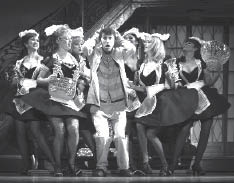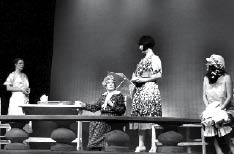Theaterweek
by Anthony Chase

DIRTY ROTTEN SCOUNDRELS
Dirty Rotten Scoundrels may not be as familiar a title as others on the Shea’s lineup, but it should be. The show opened during the busy 2005 Broadway season and had to compete with a litany of wonderful musicals, including the blockbuster hit Spamalot; the clever and adorable 25th Annual Putnam County Spelling Bee; and the highly regarded Light in the Piazza. All of these shows would go on to tour.
Dirty Rotten Scoundrels has always been underrated. Its lyrics are supremely clever; its humor is wryly adult; and its parodies of numerous musical styles are inspired (my favorite of these is an unmistakable Noel Coward number). I found everything about the show delightful and entertaining.
The plot follows a high-class con artist who finds himself mixed up with a low-end hustler. The two make a bet over which of them can coax $50,000 from an innocent young heiress from Cincinnati. Twist after twist after twist ensues.
The tour, currently playing at Shea’s Performing Arts Center, is brilliant.
Tom Hewitt is suave and dryly hilarious as con artist Lawrence Jameson, the role created on Broadway by John Lithgow. D.B. Bonds is no-holds-barred outrageous as Freddy Benson, the role for which Norbert Leo Butz won a Tony Award. Laura Marie Duncan channels Teri Garr and endows her with a glorious voice in her reinterpretation of Christine Colgate, the Midwestern soap detergent queen created on Broadway by Sherie Renee Scott.
This trio is perfection.
Mr. Hewitt is an important New York stage performer, having created the role of Steve (the hunk) in the original Jeffrey and having played a very sexy Frank N. Furter in the revival of The Rocky Horror Show. (You detect the theme, I trust.) I missed his Officer Lockstock (opposite Buffalo’s Richard Ruiz as Officer Barrel) in the national tour of Urinetown, but I imagine he has been marvelous—and yes, handsome—in everything he’s done.
This show features Mr. Bonds and Miss Duncan to wonderful advantage.
The supporting cast is equally wonderful, and I would go so far as to say (and this borders on Broadway sacrilege) that I preferred Hollis Resnik over Joanna Gleason as society gal Muriel Eubanks of Omaha. While Miss Resnik is better suited for the role, in a total disclaimer, I would admit that she’s been a favorite of mine since seeing her in such Chicago productions as House of Martin Guerre and Another Midsummer Night. Indeed, she’s world famous in Chicago.
Drew McVety gives a deft and knowingly sardonic performance as the police chief/con-man with the smoldering sexuality. We do not diminish him by admitting that he is adorable.
The show is lusciously designed, with sets by David Rockwell and costumes by Gregg Barnes. Jerry Mitchell provided the clever choreography, and the ubiquitous Jack O’Brien of San Diego directed. This is a first-rate tour.
THE BEST WOMAN
Gary Earl Ross, who achieved a huge success with his play, Matter of Intent, which won the Emanuel Fried Award at the Arties before going on to win the 2005 Edgar Award for best play from the Mystery Writers of America, has turned his attention to politics in his new play, The Best Woman. Here, we meet a Clinton-esque senator running for president against an Condoleeza-esque conservative Republican, African-American woman. As the stakes get higher, each receives dirt on the other from ill-intentioned helpers.
The play derives a great deal of its fun from thinly disguised references to current events. Slightly altered names and places in the news inspire delighted audience reaction in a play, which, at present, follows a journey that is otherwise rather prosaic. Ross’ writing is witty and provides a rapid pace for actors Mary Moebius and Joyce Carolyn who play the central combatants. The playwright lavishes time on a second act television debate making it clear that his main goal is parody, not drama. This is, of course, very appealing at the comic level, though in a subsequent production, a clearer line to the play’s moral dilemma could be drawn, giving the piece more weight, shelf-life and universal appeal.
Adair Luhr projects a winning stage presence and scores hit after palpable hit in the role of the senator’s chief of staff. Moebius and Carolyn are similarly appealing as two women more admirable than most real-life politicians. The production is quite fun, and perfect for the long election season just beginning. The Best Woman continues through April 1.

ENCHANTED APRIL
The through line of Matthew Barber’s Enchanted April could not be more clear. Based on the novel by Elizabeth von Arnim and directed by Paul Todaro, this is the story of reclaiming one’s life and love. Romantic and sentimental with all the gooey shallowness and emotional indulgence that suggests, the production is very successful on these counts and succeeds in being enchanting as well.
Here we meet a collage of British women who seek refuge from their lives in a rented Italian castle but who find much more. Of course.
I especially admired the work of Susan Biesinger in the role of a jazz age aristocrat, cheated in love and misunderstood, poor thing, because of her beauty. Neal Moeller is marvelous as the charismatic owner of the castle who woos every visitor. Ellen Horst makes hay of a role in which she utters just one word in English. Jeanne Cairns delivers another of her habitually perfect performances as an embittered dowager—who naturally softens before the conclusion and who manages to provide some worldly wisdom when it is least expected.
Running through the paces of their predictable roles with yeoman-like efficiency, Neil Casey, Darcy Fowler, Kristen Tripp Kelley and John Warren are all handsome and admirable. We spend a very pleasant two hours with this happy crew.
Enchanted April is a most Kavinoky production: elegant, with an air of sophistication and (on this occasion) not too taxing on the mind or morals. Director Todaro sets a brisk yet graceful pace and aids the production with minimalistic staging, assisted by David King’s excellent set—though act two does demand a touch of architecture and an abundance of wisteria, which Mr. King dutifully provides. The production continues through April 1.
|
Issue Navigation> Issue Index > v6n12: One Piano, Four Hands (3/22/07) > Theaterweek This Week's Issue • Artvoice Daily • Artvoice TV • Events Calendar • Classifieds |









 Current Issue
Current Issue